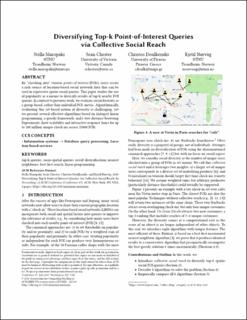| dc.contributor.author | Maropaki, Stella | |
| dc.contributor.author | Chester, Sean | |
| dc.contributor.author | Doulkeridis, Christos | |
| dc.contributor.author | Nørvåg, Kjetil | |
| dc.date.accessioned | 2021-06-07T07:23:39Z | |
| dc.date.available | 2021-06-07T07:23:39Z | |
| dc.date.created | 2020-11-02T16:49:48Z | |
| dc.date.issued | 2020 | |
| dc.identifier.isbn | 9781450368599 | |
| dc.identifier.uri | https://hdl.handle.net/11250/2758066 | |
| dc.description.abstract | By "checking into'' various points-of-interest (POIs), users create a rich source of location-based social network data that can be used in expressive spatio-social queries. This paper studies the use of popularity as a means to diversify results of top-k nearby POI queries. In contrast to previous work, we evaluate social diversity as a group-based, rather than individual POI, metric. Algorithmically, evaluating this set-based notion of diversity is challenging, yet we present several effective algorithms based on (integer) linear programming, a greedy framework, and r-tree distance browsing. Experiments show scalability and interactive response times for up to 100 million unique check-ins across 25000 POIs. | en_US |
| dc.language.iso | eng | en_US |
| dc.publisher | ACM | en_US |
| dc.relation.ispartof | CIKM 20 : The 29th ACM international conference on information and knowledge management : Virtual Event Ireland, October 19-23, 2020. | |
| dc.title | Diversifying Top-k Point-of-Interest Queries via Collective Social Reach | en_US |
| dc.type | Chapter | en_US |
| dc.description.version | acceptedVersion | en_US |
| dc.source.pagenumber | 2149-2152 | en_US |
| dc.identifier.doi | 10.1145/3340531.3412097 | |
| dc.identifier.cristin | 1844258 | |
| dc.description.localcode | © ACM, 2020. This is the author's version of the work. It is posted here by permission of ACM for your personal use. Not for redistribution. The definitive version was published here, https://doi.org/10.1145/3340531.3412097 | en_US |
| cristin.ispublished | true | |
| cristin.fulltext | original | |
| cristin.fulltext | postprint | |
| cristin.qualitycode | 1 | |
